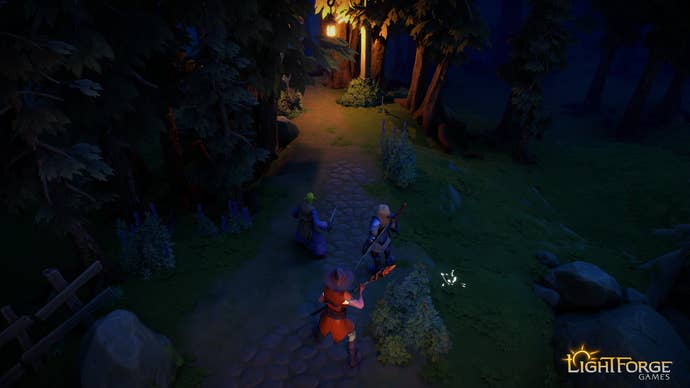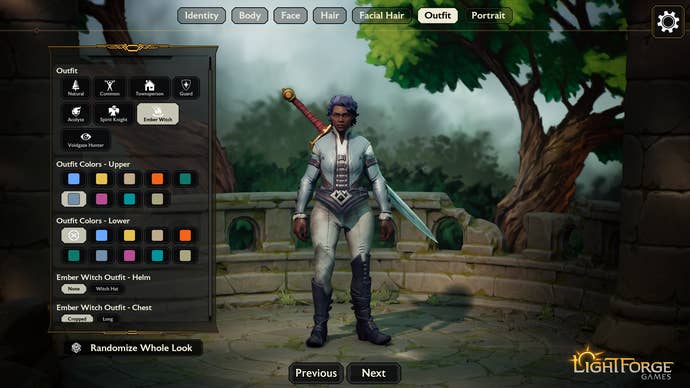Products You May Like
Have you ever tried organising your own tabletop RPG session? It can be a hassle. Learning the rules, figuring out the story, getting everyone together at once for long gaming sessions…there are ample barriers standing the way of the would-be adventurer. To help break down these barriers and unlock some of gaming’s more rewarding moments, Lightforge Games is making Project O.R.C.S, which it hopes will bridge the gap between in-person DnD sessions and video games in a new and novel fashion.
The studio goes so far as to describe its new game – a collaborative RPG in which folks can both play the role of the the heroes and orchestrate the journey much like a game master would for a Dungeons and Dragons or Pathfinder campaign – as a new subgenre. It’s dubbed a “Collaborative Storytelling RPG” – or CSRPG – by Lightforge Games CEO Matt Schembari, and the team of former Blizzard, Epic Games, and new blood developers behind it are clearly setting their sights on lofty goals. But does the game actually succeed in offering something fresh? I was able to play a bit for myself – and came away convinced of its merits.
I played a 90-minute session as a party of four, with myself and two others being led through a generated quest under Schembari’s guidance. First came character creation – wherein you not only design the aesthetics of your character, you also are able to assign a class and various background perks. I picked a Spirit Knight – a blend between a typical warrior and necromancer able to summon spectral minions by my side. But I was also able to select a background for my character, not only providing stats that’ll prove handy later but help me establish who my character is. It’s got the tone of a character creations sheet in a tabletop RPG, which considering the mission statement of the game is definitely a good sign.
We spawned into our own town and learn that various aspects of it can be upgraded through going out and completing quests. We were able to buy basic provisions for the road, but after a bit of graft our options for gearing out our characters would increase. Thus enters the very video-gamey bit of Project O.R.C.S. Much like one would upgrade their slave hostel in Palworld in order to force animals to craft guns for them, players of Project O.R.C.S can grow stronger alongside their settlement.
This application of vertical progression into what appears to be an otherwise loose RPG experience could be a real merit here. For those unsure about how to approach running their own homebrew campaign, how to scale things up in a rewarding fashion can be a real struggle. The slow upgrading of your town, and the player power that comes alongside that, seems to automatically fix that problem.
The main loop of Project O.R.C.S was clear and pleasant! Venture out on a quest, come back, upgrade your settlement, then repeat. While the game set the foundations for the session, it’s the player-controlled guide’s job to guide us through the journey. They controlled the NPCs we’d encounter as well as voice them to the adventurers, and help talk through options like a Game Master would in any tabletop RPG. It is impossible to separate this aspect of Project O.R.C.S from the tabletop experience because, well, it is the tabletop experience ported over.
The game has a lot of immediate merit to it. I like the simplified and original skill system, which is a sort of scaled back and accessible version of your traditional skill checks in tabletop RPGs. It’s got some slick creature designs, and an environment customization system that makes it really easy for both the guide and adventurers to tweak and build up quest areas. But the make-or-break question is this – does Project O.R.C.S manage to capture that tabletop feel, and how does it weigh up to its obvious competitors?
Because, while I do believe the idea to bridge the gap between video games and that pure TRPG experience is grand, you’ve got to convince folks to hop into Project O.R.C.S as opposed to dedicated tabletop adaptations. I’m happy to say that the collaborative fun and fluidity you get from tabletop gaming is present – our rescue mission somehow resolved with one of our party eloping with an Ewok-esque creature and leaving the party – the spirit is there! Assuming the studio polishes the game out and adds in enough content for folks to mess around with, Project O.R.C.S does have a place in the RPG ecosystem.
I only worry about how big a place that’ll be. Lightforge Games has to convince groups eager to play a collaborative RPG that it’s worth sticking around with the game. Being a video game provides structure and accessibility, but it also applies unavoidable barriers. The game has no choice but to compete with the boundless freedom that comes from sitting at a table or in a Discord call with other people. It’s limited by assets that require workhours to create, and it’s battling against the endless depths of a person’s imagination.

The game itself is solid. Previewed on its own merits it’s a lovely blend and well worth keeping an eye on. But the pessimist in me worries whether this bridge between tabletop and video game RPGs will be less of a pathway and more of a stepping stone. Once they’re acclimated with Project O.R.C.S and comfortable with the guided RPG experience it presents, what will keep folks around for weeks, months, and years to come?
Lightforge Games is a new, ambitious studio with 35 staff according to its website. I wonder how the game will ultimately be monetized. If it’s a standalone game for, let’s say £30 or so, that would be a reasonable price in my opinion! But given its intent as an alternative, it’ll be up against people slapping on tabletop simulator and downloading PDFs from other, better-known RPGs like DnD, Pathfinder, and Lancer from the internet.
Only time will tell how big a splash this cool spin on the RPG format will make. But as far as first impressions go, I came away feeling good about this pre-alpha version of the game and its developers’ intentions. It would have been far easier just to make a CRPG, and the confidence to try and mix it up and go in a different direction should be lauded.
